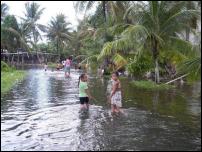 A New Zealand academic has disputed recent reports that the Pacific island of Tuvalu is sinking under the sea. Writing in the NZ Herald, Chris de Freitas, an associate professor in the School of Geography, Geology and Environmental Science at the University of Auckland, says that there has been no discernible evidence that sea levels have risen on the main island of Funafuti and what inundation has occurred in other islands is due to erosion caused by industrial activity not global warming. De Freitas also cites other factors such as the paving over of one quarter of Funafuti’s land mass which has increased rainwater runoff causing flooding.
A New Zealand academic has disputed recent reports that the Pacific island of Tuvalu is sinking under the sea. Writing in the NZ Herald, Chris de Freitas, an associate professor in the School of Geography, Geology and Environmental Science at the University of Auckland, says that there has been no discernible evidence that sea levels have risen on the main island of Funafuti and what inundation has occurred in other islands is due to erosion caused by industrial activity not global warming. De Freitas also cites other factors such as the paving over of one quarter of Funafuti’s land mass which has increased rainwater runoff causing flooding.De Freitas also quotes a growing body of research that says that global warming will cause sea levels, which have been rising since the end of the last ice age, to either stabilise or possibly even fall. Some scientists believe there is an inverse relationship between global temperatures and sea levels, due to sea surface evaporation that transports moisture to the polar ice caps.
Dr. John Bratton of the US Geological Survey argues that global warming could cause sea level to fall for another reason. He believes the temperature rise would cause the melting of sea-floor crystals of ice (known as clathrates) which enclose gases such as methane. When these crystals melt, the gas escapes leaving a hole that could cause sea levels to fall by as much as 25 meters. Bratton estimates that sea level will fall by about 1.5 meters due to this phenomenon.
Nevertheless Tuvalu remains on the frontline of climate change. Since as far back as 1992, its government has been speaking out in international forums about the impacts of global warming. More common flooding due to storm surges has increased the salinity of the soil which in turn is forcing farmers to grow their root crops in metal buckets instead of in the ground. Tuvalu’s government have had little success in getting their big international neighbours to change their ways. “The oil industry is powerful” said local politician Paani Laupepa. “It works in sinister ways to maintain its grip on the politicians”.
Historically Tuvalu was southern Ellis part of the Gilbert and Ellis islands but opted for separation (from what is now Kiribati) and then independence in 1978. The name Tuvalu means “eight standing together” and refers to the number of populated islands in the chain. It relies on international aid (which has been put into a trust fund) and the US, Taiwan and Japan also pay lucrative amounts for fishing rights. In 1998 Tuvalu sold 80 percent of the rights to the “tv” internet domain to a Californian company for $48 million. Tuvalu still makes $3 million a year from the remaining 20 percent share with internet registrations rising by almost half in the last two years.
 Tuvalu is a chain of nine islands with a population of roughly 11,000 making it the smallest voting member of the UN. The islands are mostly two to three metres above sea level and its coral atoll villages already flood at high tide. In the IPCC fourth assessment report released last year gave a range of possible sea level rises up to a metre by 2099 so most of the islands seem safe enough in the short term.
Tuvalu is a chain of nine islands with a population of roughly 11,000 making it the smallest voting member of the UN. The islands are mostly two to three metres above sea level and its coral atoll villages already flood at high tide. In the IPCC fourth assessment report released last year gave a range of possible sea level rises up to a metre by 2099 so most of the islands seem safe enough in the short term. Citizens of Tuvalu are among seven million Pacific Islanders who are most at risk. Although Pacific nations contribute just one percent to global greenhouse pollution they suffer the worst of the extreme weather events and other climate change impacts. When air temperatures rise, the oceans heat up and cyclones become more frequent and severe. Changes are causing many to leave to Australia and New Zealand and these people have been called “climate refugees”.
Now a Japanese activist and journalist Shuichi Endo has set himself the task of photographing the entire population of Tuvalu (10,000 people) in order to draw political attention to the threat they face from global warming. Endo said the islanders live in tune with their environment and the rest of the world could learn a lot from them. "If industrialised countries like Japan and the United States don't cut their greenhouse gas emissions, the Tuvaluans won't be able to carry on living here," Endo said. "Their culture will be lost, the Tuvaluans will no longer exist."
No comments:
Post a Comment